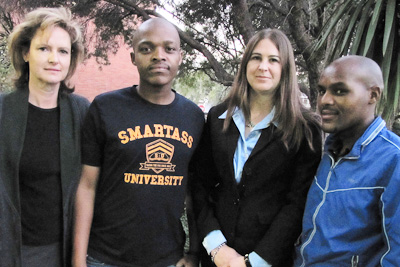Latest News Archive
Please select Category, Year, and then Month to display items
09 December 2020
|
Story Carli Kleynhans
|
Photo Supplied
 Carli Kleynhans.
Carli Kleynhans.
With the most gruelling year recorded in our entire lives, gradually coming to an end we remain hopeful and thankful that we have made it through. From the unexpected shock of going into lockdown, to the worry of having to use a blended approach to succeed in your academics and now finally settling into a new normal, we at the advising office bestow upon you the title of Kovsie champion…because that's exactly what you are!
One of our many champions, Carli Kleynhans, a 3rd (final) year student enrolled for BA Psychology and English shares how she survived…no, actually how she has thrived in 2020.
• What was your biggest concern about your academics when you found out the country was going into lockdown?
My biggest concern about my academics as a final year student was whether the online learning and tests would provide the same in depth learning experiences that are necessary to build upon for future studies.
• What are some of the challenges you've experienced along the way?
Staying focused and trying not to procrastinate was a big challenge I had to conquer, especially trying to not be distracted by my family and my phone. How I survived and was able to thrive in 2020!
• What are some of the strategies you've used to ensure your academics don’t suffer?
Time management was one of the most important strategies that I applied. For most of my classes, I was able to focus each week on a different module, by working and studying in advance I was able to keep up with my workload and still have the weekends to focus on myself, therefore creating designated time to work, study and also time to relax and read.
• What support have you received from the institution that's helped you thus far?
Most of my lecturers have provided needed support regarding our academics. The institution helped provide clarity with everything that was going on.
• What do you think the UFS could have done differently to support student success?
I think the UFS could have provided more resources for the final year students, especially considering we have to apply for further studies; online it was difficult to discern exactly what was necessary for the applications, whereas in class I feel more information would have been provided.
• What has kept you motivated?
Knowing it is my final year has helped to motivate me, as I have to use these grades to apply for further studies. I recently received recognition from Golden Key and this helped to further inspire me to work even harder at my academics.
• What advice do you have for your fellow Kovsies who are finding it difficult to keep going?
Remember to make time for yourself, to look after yourself and your mental health, especially in these difficult times. Work in advance and keep to your personal academic calendar.
UFS students listen to world expert in environmental law
2010-08-05
 |
Dr Ilze Keevy, Kabelo Khara, LL.B. final-year student in Environmental Law, Adv. Antoinette Ferreira, and Luthando Tshangana, also an LL.B. final-year student in Environmental Law.
Photo: Leonie Bolleurs |
In one of her classes, Dr Ilze Keevy, Senior Lecturer in the Department of Constitutional Law and Philosophy of Law at the University of the Free State (UFS), invited Adv. Antoinette Ferreira, a Senior Prosecutor at the Special Prosecution Unit of the Director of Public Prosecution: Free State, this week to present an interesting and topical lecture about Organised Environmental Crime and Biodiversity. The lecture was, amongst others, attended by LL.B., LL.M. and LL.D. students in Environmental Law, as well as master’s students in Environmental Management.
Adv. Ferreira, who is currently working on one of the world’s most important syndicate cases about rhinoceros hunting, dealt with environmental law in her lecture, with the focus on organised crime syndicates. Issues like how syndicates operate, the prosecution of syndicates and all the problems related to the destruction of our South African biodiversity formed part of her lecture. – Leonie Bolleurs